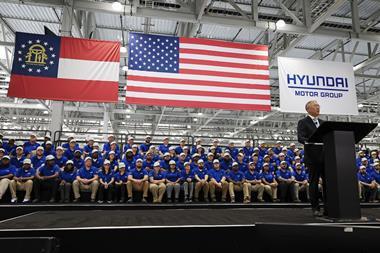There is an old Chinese proverb which states “To be uncertain is to be uncomfortable, but to be certain is to be ridiculous”. And how uncomfortable times have been for many players in the automotive industry over the past few years with fluctuating production demands, increasingly global supply chains, and a stronger environmental focus.
One area of the supply chain where this has been noticeable for many is packaging, specifically reusable packaging, where some companies have found themselves with stockpiles of their own containers so large they would put the great pyramids of Egypt to shame. These idle assets have inadvertently identified inefficiencies and costs that have only added to the woes of a troubled sector.

So, what’s the alternative? For years arguments have raged over whether it is better to use one-way packaging, purchase and manage your own pool of packaging, or to outsource everything to a pooling solutions provider. The results vary considerably depending on transport distance, component sensitivity, pack efficiency, handling preferences or environmental impact, to name a few.
The argument for the use of one-way packaging has grown weaker, except in cases of intercontinental transport distances. Here, the return, empty transport costs of a container pool are rarely viable. However, the increasing flow of components between continents is also resulting in outsourced pooling providers being able to offer value where rebalancing is possible.
One-way packaging often has a perception of being ‘lower cost’. This may be true if only considering the purchase cost of a cardboard carton. However, when including component damage, extra handling, transport utilisation, disposal and other costs, this is rarely the case, with both an own pool or an outsourced pool providing more savings. One-way packaging also has been proven to be less environmentally friendly than most reusable options.
Even though during times of uncertainty one-way packaging may be attractive, the long-term impact of this packaging is not seen as the best business solution.
The case for in-house pools
The argument for purchasing and managing your own pool of containers is an interesting one. In the case of racks or containers designed specifically for a single component shape, largescale outsourced pooling is often not viable, with ownership the only option available. A common belief also exists that the benefits of owning and managing a pool of assets is attractive when suppliers and customers are in close proximity to each other, and where limited maintenance is required.
However there is a breaking point where sinking capital into an own pool and spending resource and money on the management and replacement of this own pool simply does not make sense.
The financial impact of this situation has been exposed even more over the past few years, with wasted capital sitting in the yards of many companies, the euros, dollars and pounds disappearing day-by-day.
The case for outsourced pools
This makes the argument for outsourced container pooling stronger than ever, especially with companies, such as Chep and others, offering a choice of complete outsourcing or management of your own assets. Not only is capital freed and available to be used for core business investment, the hassle and administration of tracking, tracing, cleaning and maintaining an own pool of containers is eliminated.
Some people may argue that complete outsourced pooling is more costly than owning and managing a pool in-house, or using one-way packaging. This may be true if only looking at the purchase costs compared with hire fees. Studies by Chep have consistently proven that outsourcing container management delivers overall supply chain savings of between 15-25%. Outsourcing also enables companies to use only what they need when they need it. So the challenge of uncertainty, seasonality, or fluctuating production is now removed.
Where non-standard or specialised racks and containers are required and owned by a supplier or manufacturer, container pooling offers a management service to remove the hassle and costs for doing this in-house. Non-core activities are then removed, allowing the business to focus on what is most important–manufacturing components and assembling cars.
Perhaps, coming back to the Chinese proverb on uncertainty and certainty, it is better to ease the discomfort of uncertainty at the very least, and outsource container pooling to a dedicated provider.

























![Global[1]](https://d3n5uof8vony13.cloudfront.net/Pictures/web/a/d/s/global1_726550.svgz)










